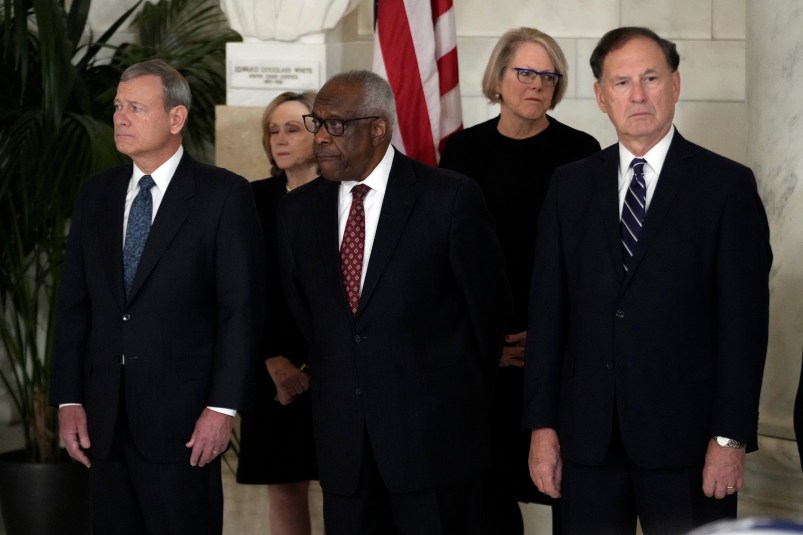There were so many things that happened yesterday in the Supreme Court’s hearing on presidential immunity that it’s hard to know where to start. But one part that captured it for me was Sam Alito’s line of argument that presidential immunity might be necessary to make it possible for presidents to leave office voluntarily, or that not having some broad grant of immunity would make refusal to leave office more likely. Here’s one of the quotes: “If an incumbent who loses a very close, hotly contested election knows that a real possibility after leaving office is not that the president is gonna be able to go off to a peaceful retirement, but that the president may be criminally prosecuted by a bitter political opponent, will that not lead us into a cycle that destabilizes the functioning of our country as a democracy? And we can look around the world and find countries where we have seen this process, where the loser gets thrown in jail.”
I think it’s safe to say that as a policy matter this is a very bad way to approach presidential accountability, the rule of law or the peaceful transfer of power. But that really isn’t the big point to me. It’s that the subtext of so much of yesterday’s discussion and — often the explicit statements from the justices during it — was that this is a new question that the Supreme Court is now tasked with crafting a policy to address. Neither is the case.
I am not naive enough to think that judicial interpretations and rulings don’t have policy implications. Of course they do. What’s more, the policy implications of judicial interpretations frequently are a reasonable part of the prudential analysis that goes into judges’ work: if we think the law and the Constitution say something, we need to have open eyes about what that something actually means in practice. What was so striking about yesterday’s performances, if not at all surprising, were that there was little effort to even keep up these pretenses. It was almost like these were de novo questions. Even down to the point where multiple justices waived off dealing with the actual case and facts before them, arguing that they’re being called upon to set up the big rules for posterity.
Listening to Sam Alito, but really Kavanaugh and Roberts too, you get the sense that if they decided that presidents need to be immune from possible prosecution forever for whatever policy reason they think makes sense … well, elections have consequences and it’s up to them to make that choice. But that’s not how any of this works. If you really want to get into history to make this ruling, it is the plainest thing in all the discussions around the authorship and ratification of the federal Constitution that presidents remain citizens. The core dynamic in the process of creating the Constitution was the belief that the country needed a more unified and powerful executive authority without making that person above the law, which is to say, a king. Presidents are not above the law. When they leave office they give up all their powers. The text itself gives not the slightest hint that presidents have immunity from the law.
You can play devil’s advocate and say: well how is it then that the Justice Department and pretty much the whole legal and political class has decided that a president can’t be prosecuted while in office? There’s an answer to that. There are numerous principles in the common law that say that you can’t be a judge in your own case. The president is the officer who enforces the laws. He can’t prosecute himself. It’s a contradiction in terms. Well, is there a defect in the Constitution? Did they leave something out? No. It turns out that the Constitution creates a process to resolve this contradiction. The document invests the political process with a means to deal with a law-breaking president: Impeachment. The Congress can remove the president. Now someone else is charged with enforcing the laws, and the contradiction is resolved. Some people disagree with this logic. But this is the proper process of looking at the document — resolving seeming contradictions or problems by looking at the whole document and trying to see what it prescribes, how it charges us to resolve seeming contradictions within it.
The display we saw yesterday was a vivid illustration of how the Court has gone thoroughly rogue, cutting itself off from even the appearances of the processes that give it legitimacy. That is the core of the current Court’s corruption. If we assume that there might be some limited ways that official acts can’t be reinterpreted as crimes, it seems to go without saying that refusing to honor the results of an election can’t be one of them. Trying to overthrow the government can’t be one of those official acts. If that’s the case — this hypothetical, narrow kind of immunity — then the Court’s proper path is clear. You say that there may be some cases where a very narrow kind of immunity applies. But what we have before us now certainly isn’t one of those cases. End of story.
But that’s not what we got.
It’s certainly the case that justices aren’t bound by things they say in the process of airing an issue. So perhaps this was all just the equivalent of the preposterous hypotheticals that a law professor raises in a class on constitutional interpretation. But lets be real. We know who these people are. They’re telling us.
It’s a rogue court, a thoroughly corrupt one, one that is so far gone in its corruption that it feels free even from the practical obligation to clothe its corruption for the sake of appearances.




